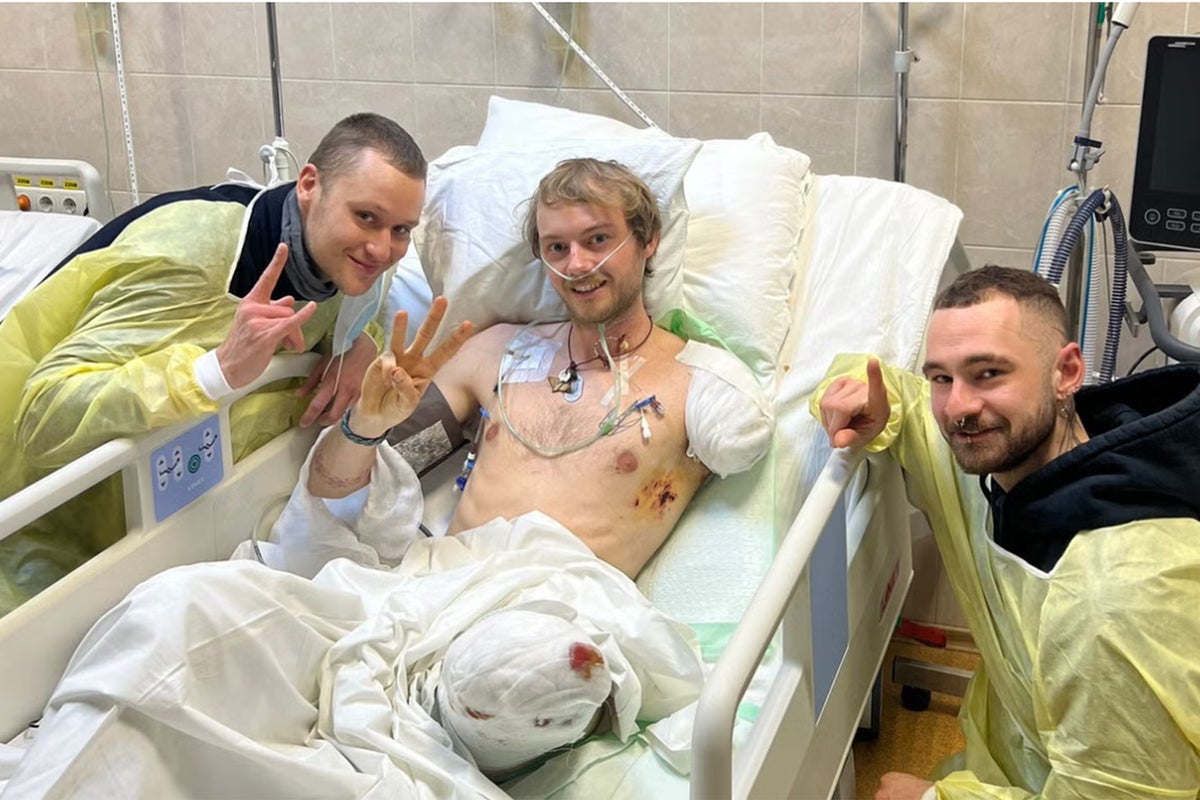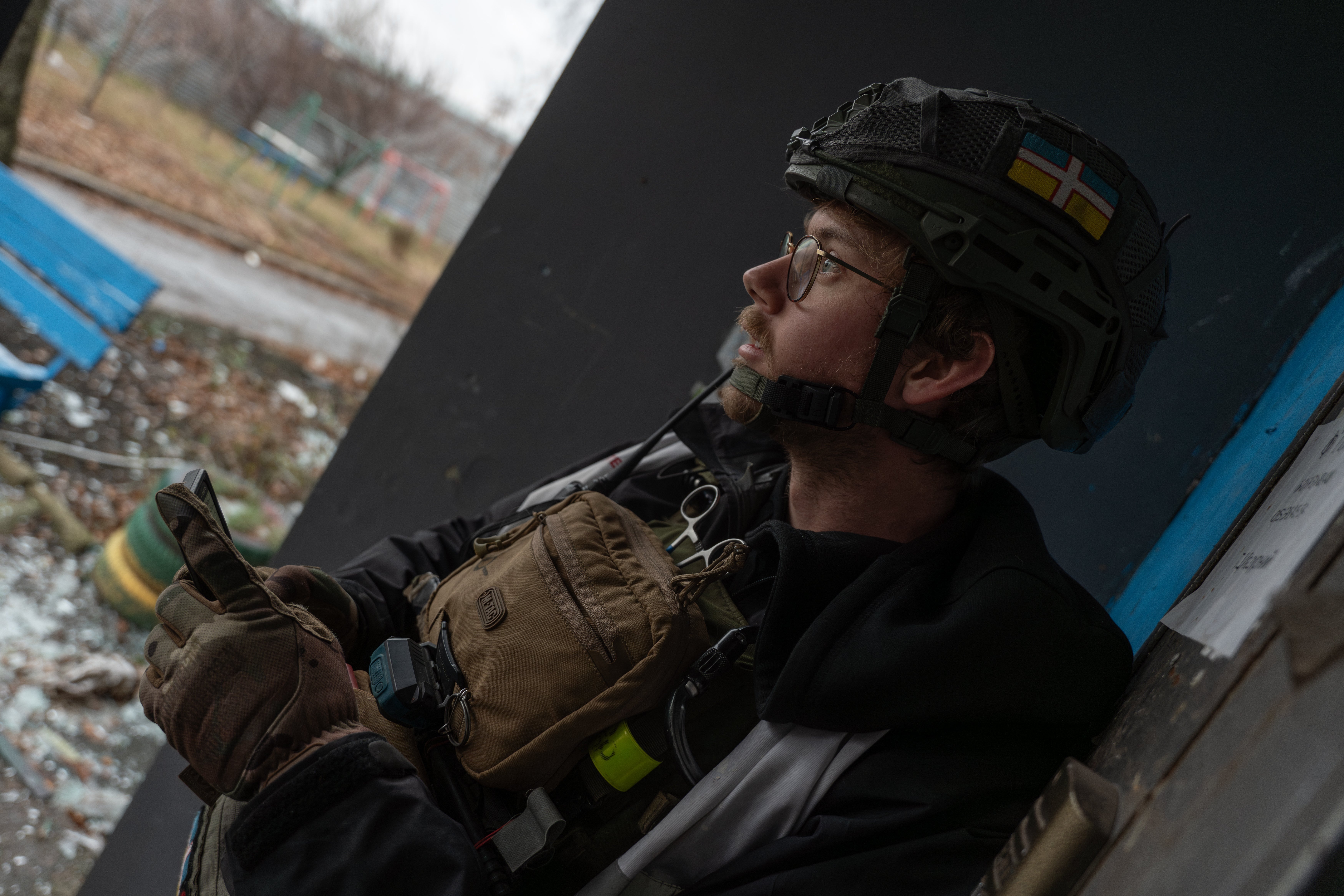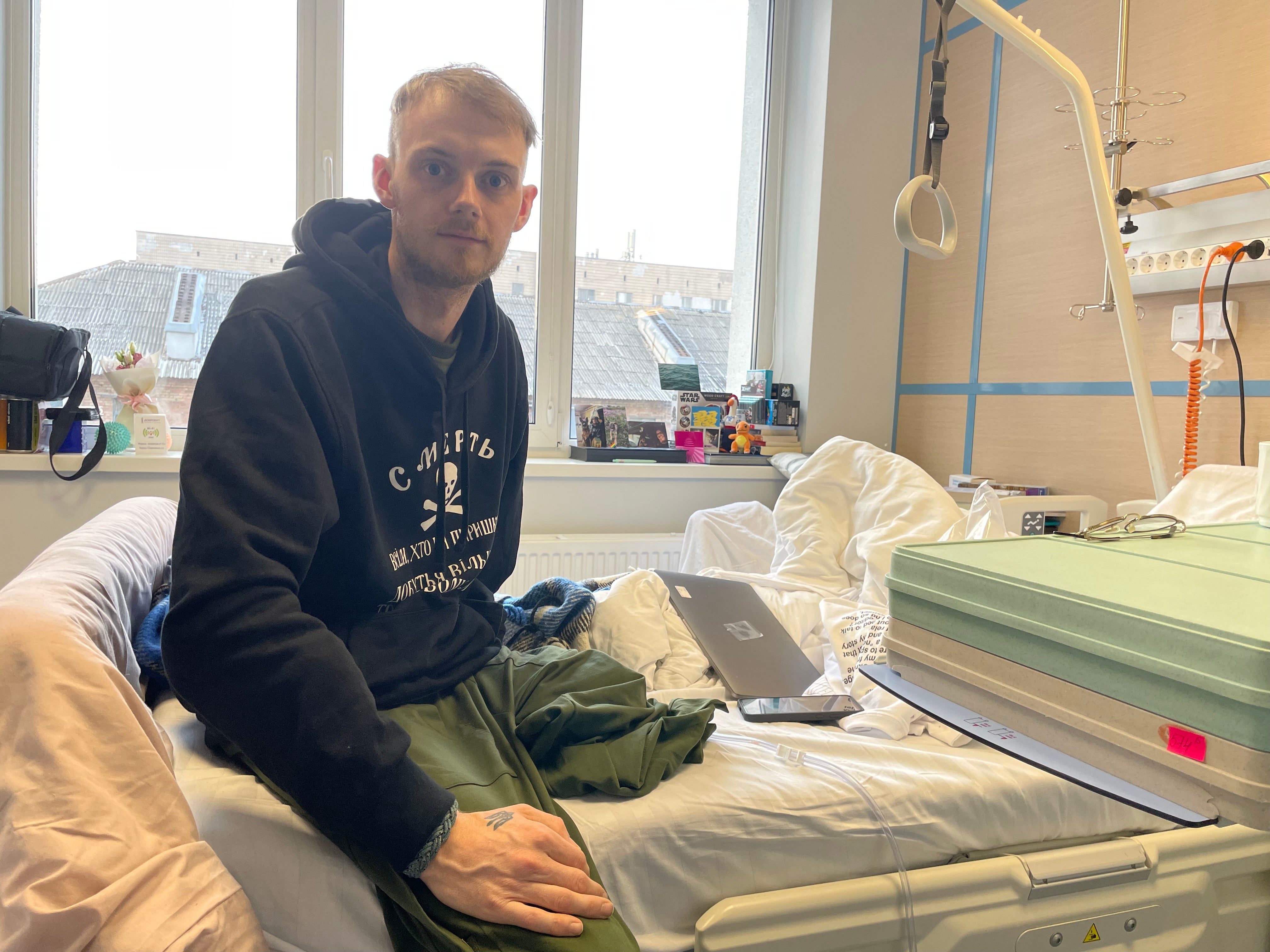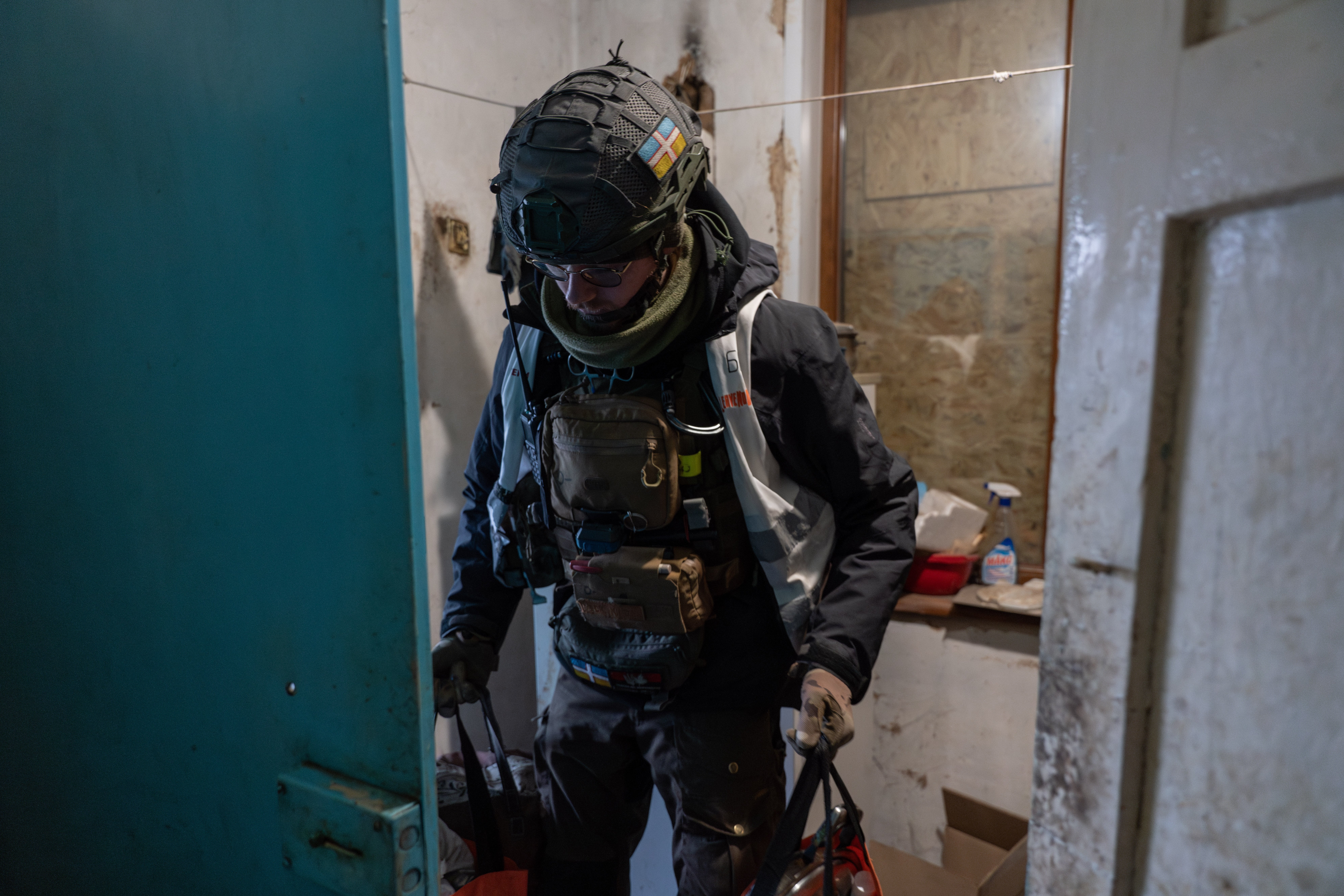
Eddy Scott, a young British civilian volunteer medic, was evacuating people from one of Ukraine’s most wartorn locations, Pokrovska, when his vehicle was targeted by bombs dropped from Russian drones which blew off his left arm and leg.
The Independent visited him in a hospital in Kyiv, where he was transferred after initial treatment at two facilities near the frontlines in the country’s east. That morning we had both been woken by Russian ballistic missiles that began slamming into the Ukrainian capital before dawn, injuring many and killing at least one person.
“It woke me up although I don’t sleep very well because I have really bad phantom limb pains - it feels like someone is running a hot knife along where my arm and leg were,” Mr Scott said. “For a moment I thought I was back in Pokrovsk. But once you’ve actually been blown up, if it doesn’t land next to you, everything else feels far away. So I wasn’t worried.”
Ukrainians are told that if they cannot get to a shelter after an air raid alarm sounds, they should try to put two walls between themselves and outdoors.
“So when I heard a second ballistic missile coming in I wheeled myself into the bathroom,” Mr Scott explained. The Russian missiles exploded in multiple districts throughout Kyiv, including the one his hospital is in.
Despite the intense pain, the Briton is remarkably composed a little over two weeks after a nightmarish experience that would have psychologically shattered so many others.
“My injury is life-changing but it’s not life ending,” he said. “I now have a future in Ukraine and can continue to help Ukraine in ways that probably couldn’t before I had this spotlight one me that puts me in a position to really do something.”
Click here for the latest updates on the Ukraine war

Mr Scott not only wants to advocate for the thousands who have had limbs amputated because of the conflict, but highlight the consequences of Russia’s aggression.
“Look at what’s happened to me - this happens to civilians in Ukraine all the time,” he said. “I want to make the world realise this wasn’t some random event war crimes are part of Russia’s strategy.
“The only reason I’m here is to help Ukraine. I’m here because Ukraine needed help and I thought I could help. If this means that I get to continue to help Ukraine, get to live here, get to be happy here, then I’ll take that.
“It’s cost me an arm and a leg but I think it’s a pretty good price to pay.”
The 28 year-old’s life now is a world away from his upbringing, part of a farming family in Dorset. After attending the exclusive Sherborne private school, he skipped university to follow his passion for sailing.
He became interested in Ukraine after watching documentaries about the conflict there a number of years before Russia’s full-blown invasion in February 2022 and following the social messaging posts of military and civilian volunteers.

After dismissing becoming a soldier, he looked more closely into the work of civilian volunteers in the conflict. He bought a four wheel drive vehicle and arrived in Ukraine in 2022 where he started working with a variety of small aid groups.
He has since transported food, water, and medical supplies for civilians in hotspots near or, as is the case with Pokrovsk and Chasiv War, at Ukraine’s 600-mile long frontlines and evacuated people trapped by fighting which has closed down train or bus travel.
On 30 January he described how he was driving, in the northwestern part of Pokrovsk, a white, four wheel drive car clearly marked as belonging to a humanitarian aid organisation called Base UA.
“Our vehicles are obviously non-military,” he said. “They don’t even have electronic drone-jamming antennas that are used by military vehicles.
“We were going very slowly, less than 20 mph, so they could see what they were aiming at. So it wasn’t a mistake - they would have had plenty of time to choose where they were going to hit. We heard the drone about 30 seconds before it hit. They were aiming for me as the driver.”
Mr Scott remembers the pain from the shrapnel that ripped through the door and side of the vehicle. He realised he was badly injured and incapable of driving. His colleague, though injured himself, gave first aid and managed to eventually get him into an ambulance which headed to a small medical facility west of Pokrovsk and then to a proper hospital in the city of Dnipro.
He said he remained conscious all the time. “I was lying there and thought I could just go to sleep although I knew that would be bad and I’d probably never wake up,” he explained. “The guy in the ambulance was slapping my face and pouring water on it.
“I got six litres of Ukrainian blood put into me. So I’m Ukrainian now,” he laughs.

He said in the situation had rapidly worsened in the weeks leading up to that fateful evacuation run in Pokrovsk, where Russian troops are closing in, sometimes less than two miles from the town.
“I and many of my friends had reconciled ourselves to dying,” he said. “Every day the ‘evacs’ were getting more dangerous, crazy and the situation deteriorated very fast. I became entirely convinced I wasn’t going to survive this war and I resigned myself to living day to day: get up, get breakfast, go to work and if you survive you get home and do it all again the next day.”
He had already formed close bonds with Ukrainian friends - civilian volunteers or soldiers - as well as many from Britain and other countries. He had already decided that Ukraine was his home and after his friends rallied around that confirmed him in his decision.
“The people living and dying on the front lines are ordinary Ukrainians who I find amazing - selfless, compassionate, incredibly generous. People need to see it’s not some corrupt east European hellhole a modern, forward-thinking, progressive in certain ways, getting more progressive. It’s a country where the people deserve to win.”
He has refused offers of being transferred to the UK and is adamant he will remain in Ukraine. A charitable NGO, the R.T. Weatherman Foundation, has committed itself to covering his treatment, including the complicated process of fitting Scott with a prosthetic arm and leg. He is eligible for the benefits given to all Ukrainian and non-Ukrainian wounded war veterans - whether civilian or military. And donors have already raised a large sum which he hopes to use for the construction of a home for himself in Ukraine that is adapted to his needs as a double amputee.
“I’ve got no regrets,” he said. “I don’t regret getting into that vehicle that day, I don’t regret turning a bit more right on the road or whatever. I’m now in a position where I can do far more to help Ukraine than I ever thought I’d be able to do. It sounds weird saying that I’m going to do more with less body.
“I love Ukraine and I’ve been given a future here. Yeah, it’s different from what I imagined it would be but I’ve suddenly got a very real and tangible future here; an opportunity to continue to help Ukraine, a chance to build my own life here. Ukraine and its people deserve a future in freedom and I want to live it with them.”







